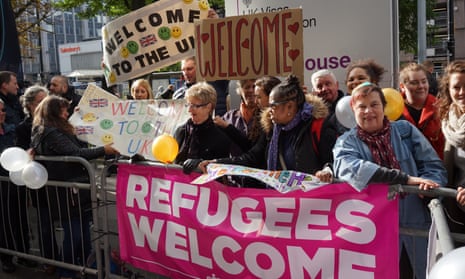Lunar House is a brutal 20-storey office block in Croydon, named after the lunar landing of Apollo 11. This architectural monster is the frontline of Britain’s immigration administration – and the reason the children from the Calais refugee camp are being bussed to Croydon, south London, to have their applications processed.
Bekele remembers his first encounter with Lunar House. The first day he waited 12 hours. It was so horrible he remembers the date: 3 March 2006. The next day he waited from 8am to midnight. Mostly, he waited outside. “I was brought up with stories of Britain and its respect for human rights. But I am sorry to say that during those early days I was robbed of my dignity.” There were no waiting facilities, no baby changing and nowhere to get a cup of coffee. Lunar House security guards nicknamed the entrance the “cattle shed”.
That was before a couple of nuns in a Winnebago turned up outside and started collecting people’s stories and distributing coffee. The security guards felt a bit uncomfortable strong-arming the nuns to leave. So they got a meeting with the head of Lunar House to discuss how immigrants were being treated there. This was the founding campaign of South London Citizens UK. One woman, a parishioner from the local Roman Catholic church, Sri Lanka-born Mary Aprigas, drove the campaign for a half-decent waiting area. In 2009 a small plaque was erected to her in the foyer of the new facilities she campaigned for. It reads: “Voice of Courage”.
Bekele has been back to Lunar House every day this week, welcoming the children coming off the coaches from Calais. And others from local churches and further afield have been working behind the scenes. We came together early on Monday morning, encouraged by the presence of the former archbishop of Canterbury, Rowan Williams, and the bishop of Croydon, Jonathan Clark. As we met for morning prayer, one of the students from the theological college read the story of the child Jesus being forced to flee his home and of how political forces conspired to murder innocent children. It all seemed horribly contemporary.
The Home Office had asked local churches to provide a pool of criminal-records-cleared adults who could sit with the Calais children as they went through their interviews at Lunar House. The Salvation Army provided goodie bags. Church buildings nearby had been set up as welcome centres where the children could meet their families and escape the press.
We tried. But in the end, what will be remembered most from this week is that this country greeted vulnerable children not with welcome, but with fear and derision. Apparently, some didn’t look enough like children. They didn’t reward our “generosity” with cherubic faces and a gratifying tear. Instead, we got gangly male teenagers with a bit of fluff on their upper lip. And we wanted them examined by a dentist, as if they were cattle.
A thousand or so children are still stuck in Calais, in the freezing mud and surrounded by every kind of threat. No wonder they had to grow up fast. They have fled Assad or Bashir, the latest versions of Herod and Hitler. And despite the fact that parliament passed the amendment tabled by Lord Dubs earlier this year, honouring the memory of the Kindertransports, so far not a single child has been brought over under that legislation. Not one. A more cynical mind might suspect that a thousand freezing children are seen by the British government as an acceptable price to pay to deter others from making the journey to Calais. Surely this cannot be the calculation being made by our vicar’s daughter prime minister?
Croydon’s most famous son is John Whitgift, archbishop of Canterbury to Elizabeth I. The town’s shopping centre and many of its businesses still bear his name. He is remembered for the schools he founded in Croydon and his concern for the young – a legacy that is being honoured by ordinary people from local Croydon churches in welcoming the children from Calais.

